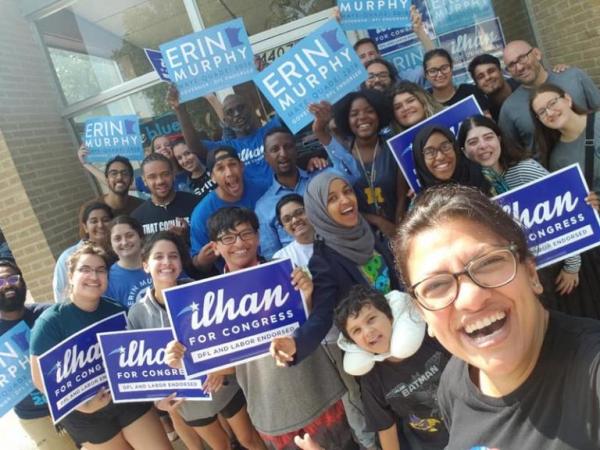
American Muslims are making history.
The unprecedented level of civic engagement and grassroots effort displayed by more than 90 Muslim political candidates and their supporters ended in victories for many last month.
Nine Somali-American, Arab-American, South Asian and African-American Muslim candidates from Minnesota won a series of primaries. Among them was Ilhan Omar — a former refugee — who won the Democratic primary in Minnesota’s 5th Congressional District.
Just prior to that, Palestinian-American Rashida Tlaib triumphed in Michigan and is now set to run unopposed in November, making her the first Muslim woman elected to Congress.
These victories illustrate what America is still capable of despite having a scandal-ridden, Islamophobic and anti-immigrant president sitting in the Oval Office and also represents something larger than just primary elections. This could be the first step in dismantling the institutionalized Islamophobia that has been empowered under the Trump administration.
“You’re not talking now. You don’t get to talk. It’s my turn. Okay? But I know where you come from, women don’t mean anything. Okay? But that’s not how it works here.” — This was not the ranting of a garden-variety Islamophobe. These were the words of Georgia Municipal Court Judge Sharon Dickson as she sentenced an Iranian-American nursing student on July 24.
That these stereotypical remarks came directly from the court bench may be surprising to some, but the bigotry underpinning Judge Dickson’s statements was not very different from biased views circulated ad nauseum by some of our nation’s top public officials.
“We have a Muslim problem in this nation,” said former Arizona state Senate majority leader Thayer Verschoor in a recently-surfaced Facebook post. His sentiments reveal not only an someone with an anti-Muslim bias sitting in public office but a larger problem of Islamophobia becoming legitimized by our government.
Verschoor shared this Facebook post shortly after joining Donald Trump’s election campaign. Under normal circumstances, any politician or candidate espousing American values of equality and religious freedom would have objected to his statements.
Instead, once elected, President Trump made Verschoor a top appointee in his administration as executive director of the Department of Veterans Affairs.
This kind of institutionalization of Islamophobia in the United States, and the endorsement of openly discriminatory beliefs and policies, have become hallmarks of the current administration. Simply put: Anti-Muslim administration officials are the new norm.
From his call for a “total and complete shutdown of Muslims entering the United States” to his actual Muslim ban executive orders, Trump has inspired an onslaught of bigotry by openly Islamophobic public officials.
Faith Vander Voort, a top spokeswoman for Interior Secretary Ryan Zinke, published a blog post in 2015 defending then-presidential candidate Ben Carson, who remarked: “I would not advocate that we put a Muslim in charge of this nation.” In his defense, Vander Voort asserted that a Muslim “could never serve in the Oval Office of the United States of America.”
Jason Spencer, a Georgia lawmaker, appeared on Showtime’s “Who is America?” and delivered a performance that was, at its core, anti-Muslim. In addition to using “sand ni**er” and other racial slurs, Spencer pretended to glance underneath the clothing of a Muslim mannequin with a selfie stick as a way to “identify a terrorist under a burka.”
Secretary of State Mike Pompeo, Senior Advisor Stephen Miller, National Security Advisor John Bolton, former Deputy Assistant Sebastian Gorka and CIA Director Gina Haspel, among others, are all cogs in the same Islamophobic machine.
Instead of standing in defense of the Constitution and America’s founding principles, some public officials are advocates of systems assembled to disadvantage minority communities.
In this administration, anti-Muslim bias is not only accepted, it is applauded and rewarded.
The gradual shift of Islamophobia from the fringes of American society to the Oval Office comes with consequences. Between 2013 and 2015, the Council on American-Islamic Relations (CAIR) found that anti-Islam bills became law in 10 states.
The two-year period between 2014 and 2016 also saw a 65 percent jump in anti-Muslim bias incidents, partially inspired by the policies and rhetoric of Donald Trump. Last year marked the second consecutive year of steady increase in anti-Muslim hate crimes since the 2016 election.
According to a more recent CAIR report, the first quarter of 2018 also saw a spike in prejudice against American Muslims. Not surprisingly, government agencies instigated 31 percent of all bias incidents.
Despite these negative consequences, many American Muslims are rising to the occasion in cooperation with other communities–immigrant, Hispanic, African American, Sikh, Jewish –to uphold our American tradition of religious inclusion and diversity.
The political mobilization and grassroots efforts inspired by Trump’s election could be the first step in dismantling institutionalized Islamophobia.













